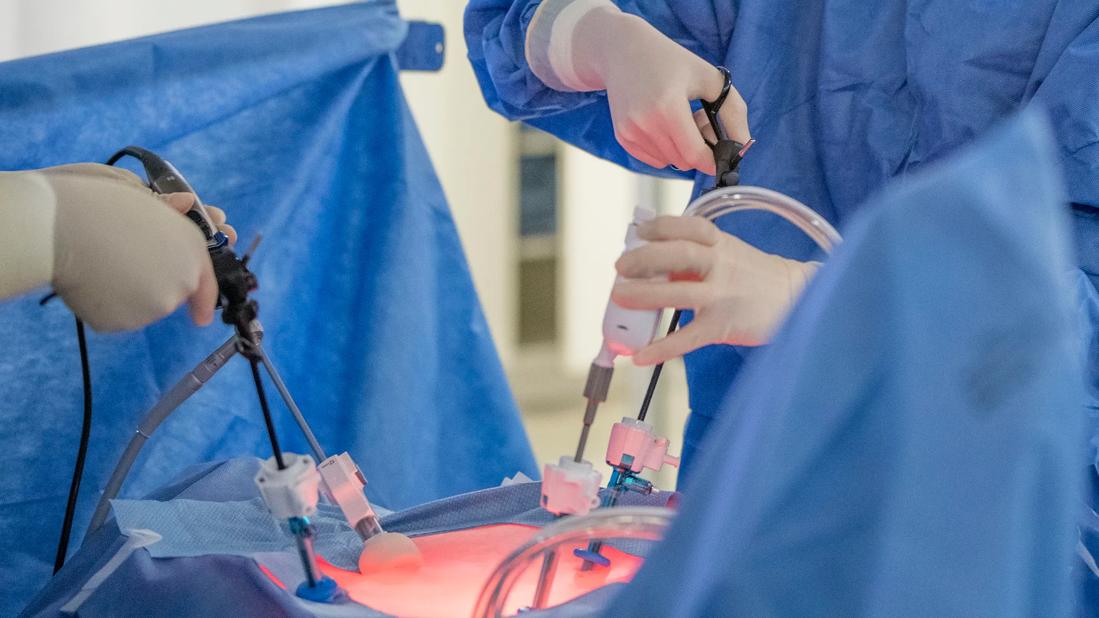Perioperative nurses jumpstart careers by mastering specialty clinical practices

In years past, perioperative nurses only had one way to gain hands-on experience in their specialty: assist during a live procedure under the guidance of a preceptor. The high-stakes surgical environment can be a formidable place to learn, however, leading some nursing experts to seek an alternative approach.
Advertisement
Cleveland Clinic is a non-profit academic medical center. Advertising on our site helps support our mission. We do not endorse non-Cleveland Clinic products or services. Policy
A new program at Cleveland Clinic is now providing a more relaxed, specialty-specific educational setting for perioperative nurses, where they’re taught to master the skills needed to support patients and the surgical team during minimally invasive procedures. Designed to give nurses the time and guidance required to understand laparoscopic techniques, the course provides an in-depth look at the equipment, instrumentation and supplies used in each nurse’s given surgical specialty.
“The operating room is an intense, fast-paced place, where patient safety is nonnegotiable – but those elements can make it a difficult teaching environment,” explains Anita Parry, MSN, RN, CNOR, Perioperative Educator Program Coordinator at Cleveland Clinic Hillcrest Hospital. “In the middle of a procedure, a preceptor may not have the bandwidth to tell a new nurse how to troubleshoot a certain piece of equipment, for example. The pressure can also compel preceptors to perform the most challenging tasks themselves rather than delegating them to a preceptee. We created this training program to circumvent those challenges and give nurses the space they need to learn, practice and ask questions freely.”
Although new Cleveland Clinic nurses take part in a specialized, six-month perioperative nurse residency, the program doesn’t typically address the substantial number of hospital-specific tools used in minimally invasive surgery. This gap can steepen the learning curve for inexperienced nurses, many of whom may require a longer onboarding process, notes Parry.
Advertisement
The national nursing shortage seen during the COVID-19 pandemic further highlighted these knowledge gaps, she adds, when a stream of new nursing school graduates was hired to fill vacancies once filled by more experienced caregivers.
“It’s essential for perioperative nurses to have a strong understanding of how to prevent patient injuries, recognize potential complications, and program and operate different devices and instruments, but six months isn’t much time to learn all of that,” says Parry. “The extra experience is a game-changer, especially for those who are just beginning their careers.”
The need for high-quality nursing education will only intensify, she says, noting that the number of laparoscopic procedures performed in the U.S. has grown by 111% in the last two decades.
Each structured, half-day clinic enrolls a maximum of six caregivers. The small class size ensures that participants receive the personalized instruction they need, Parry notes.
Soon after launching the first course two years ago at Hillcrest Hospital, Parry was asked to share her content and educational strategies with Cleveland Clinic’s other perioperative educators, who have taken her lead by developing similar programs at their individual sites. Parry’s teaching model has been so effective, in fact, that its principles have been integrated into the standard perioperative nurse residency curriculum for all nurses hired by the healthcare system.
“The feedback we’ve received indicates that the extra education has helped increase our nurses’ competency and confidence with laparoscopic surgery – and that’s what I consider a success,” she says.
Advertisement
Advertisement

Planning continues with critical, patient-focused input from nursing teams

Strengthening care through targeted resources and frontline voices

Embracing generational differences to create strong nursing teams

CRNA careers offer challenge and reward

An unexpected health scare provides a potent reminder of what patients need most from their caregivers

Cleveland Clinic Abu Dhabi initiative reduces ICU admissions and strengthens caregiver collaboration

Veteran nurse blends compassion, cutting-edge transplant training and military tradition to elevate patient care

Embrace coaching and other tips to be a stronger leader